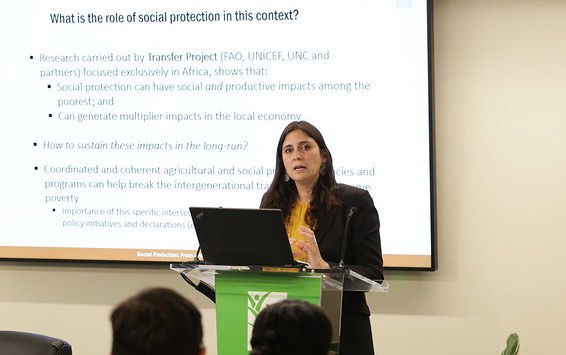Social protection—public or private initiatives that aid the poor and protect the vulnerable against risks to their livelihoods—is key to efforts to reduce hunger in Africa, according to a report by Regional Strategic Analysis and Knowledge Support System (ReSAKSS) project. The Africa-wide Annual Trends and Outlook Report focuses on a topic of strategic importance to the African Union agenda and its member states; the 2017-2018 report is titled Boosting Growth to End Hunger by 2025—The Role of Social Protection.
At a May 2 IFPRI seminar, participants explored the report’s findings and the policy implications for the design and roll-out of social protection programs in Africa.
Social protection is key to faster growth and lower vulnerability across Africa, explained IFPRI Director for Africa Ousmane Badiane. “Failing to address the issue of inclusion and social protection may lead to social and political instability in the future,” he said. With the surge in urban populations and declining traditional pension schemes and family assistance, he said, citizens will demand that governments do more to protect the poor.
IFPRI Senior Research Fellow Fleur Wouterse, co-editor of the report, noted the three key aims of social protection: To protect households against hunger, to prevent household asset depletion, and to promote livelihoods. Most Africans still making their living from the land, she explained, and thus are particularly vulnerable to weather-related shocks and other natural disasters. A key takeaway of the report, she said, is the role of social protection in breaking intergenerational cycles of poverty; it can contribute to growth by enhancing human capital and agricultural productivity, reduce inequalities, and build resilience.
Chapter two author Natalia Winder Rossi, senior adviser and Social Protection Team leader at the UN Food and Agriculture Organization, explained that carefully designed social protection programs that can address, across sectors, the different ways that how rural dwellers earn a living are critical in a world where 736 million people are classified as extremely poor and many of them concentrated in rural areas. A recent joint research program, she noted, demonstrates that national cash transfer programs have both social and productive impacts among the poorest and increase food security.
“Cash has results, we show that cash plus has added results—but we still are asking ourselves, is that enough?” said Rossi. Her team continues to grapple with how to coordinate programs across sectors, as complementary interventions add value.
Amid these hopeful messages, University of North Carolina Public Policy Professor Sudhanshu Handa, urged caution on the language used in messaging around social protection. The idea of graduation programs—time-bound, short term, with narrowly focused ideas of income growth as a pathway out of poverty—forces governments to confront difficult choices, he said. Finance ministers with limited resources are likely to choose graduation programs over long term social protection programs. The typical beneficiaries of Zambia’s recent cash transfer program are from labor-constrained households, Handa explained, and such individuals are unable to ever really graduate. The risk of this kind of predicament must be kept in mind, he said, otherwise movements toward social protection systems will stall.
Following on Rossi’s remarks, Rob Vos, director of IFPRI’s Markets, Trade and Institutions Division, explained that social protection programs must be coherent if they are to help households manage risk and invest more in agricultural inputs. Vos also posed several questions for discussion, including: How can social protection be made effective within the context of agricultural and rural development policies, and are we spending cost-effectively?
The event concluded with Badiane telling the audience to stay tuned for the 2019 report, which will focus on gender.
View the presentations and discussion here.
Katarlah Taylor is an IFPRI Senior Events Specialist.







